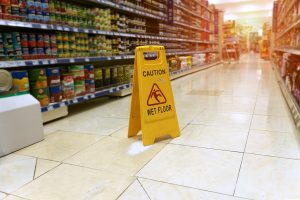
Photo Credit: Paul Biryukov / Shutterstock.com
Slip-and-fall and trip-and-fall accidents in Louisiana are, in some ways, somewhat similar to those types of cases in other states. In order to obtain compensation for your injuries, you need proof that the person or entity you’ve sued either caused the problem, knew about the problem (and did not act), or reasonably should have known about the problem (and did not act). Getting the evidence you need to succeed in your case is vitally important because a slip-and-fall or trip-and-fall injury can be serious and can have life-altering effects on you. To make sure that you are amassing the proof you need, be sure you have retained the services of a knowledgeable New Orleans premises liability attorney.
One nearby slip-and-fall case that demonstrates what it takes, in terms of proof, was the lawsuit filed by D.F. D.F. was a shopper in a supermarket in Mandeville when she slipped in Aisle 12 on a clear liquid substance, suffering injuries as a result. When you go to a store, you probably presume that the store you’ve entered is safe for shoppers in all relevant areas. Unfortunately, that isn’t always the case.
In Louisiana, the law says that you must prove one of three things in order to succeed in your slip-and-fall accident litigation against a merchant. You have to show that the store caused the hazard, that the store had “actual notice” that the hazard existed, or else that the store had “constructive notice” of the hazard. You can meet this last option (“constructive notice”) by showing that the store didn’t use sufficient care in inspecting the premises, and, if it had used reasonable care, it would have known about the problem.
One of the keys in any personal injury case, including a slip-and-fall accident, is getting past a defense request for summary judgment, which would cut off your claim before you ever even got to trial. In D.F.’s case, the appeals court concluded that the store was not entitled to summary judgment, but instead the shopper was entitled to go forward pursuing her case. This is important because, many times, a defendant may only begin making serious and fair settlement offers after it has lost its summary judgment motion.
D.F.’s evidence was adequate to show that she was in Aisle 12 for 10 minutes before her fall, and no one else was in the aisle during that time. This meant that, at a minimum, if a jury believed the shopper’s evidence, proof existed that the clear, oily substance was on the floor for more than 10 minutes. This was enough to allow a jury to decide exactly how long the hazard existed on the floor and whether or not that length of time was adequate to meet the hurdle of “constructive notice.”
If you’ve been hurt in a slip-and-fall or trip-and-fall accident inside a store, call upon the Cardone Law Firm, where our experienced Louisiana premises liability lawyers have spent many years providing our clients with the useful advice and helpful representation they need to get the compensation they deserve in their premises liability cases.
For your confidential consultation, contact us online or phone Cardone at 504-522-3333.
More Blog Posts:
Louisiana Court of Appeal Awards Damages to Parents in High School Student’s Sidewalk Slip-and-Fall Case, Louisiana Injury Lawyers Blog, May 22, 2018
‘Open and Obvious’ Hazards and Premises Liability Cases in Louisiana, Louisiana Injury Lawyers Blog, June 29, 2015
 Louisiana Injury Lawyers Blog
Louisiana Injury Lawyers Blog

